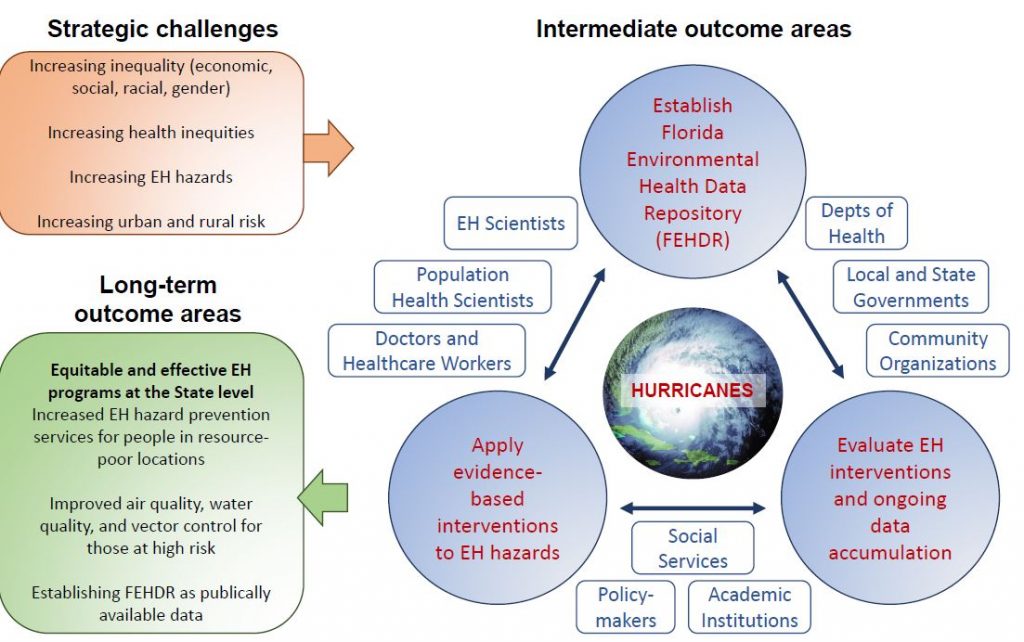PKG Social Impact Internships: Isabella Gándara (’24)
My name is Isabella Gándara, and I am currently a freshman at MIT, prospectively majoring in Course 20. For IAP, I had the opportunity to complete a Social Impact Internship with the Florida Institute for Health Innovation (FIHI) to support their work under a CDC-funded grant for environmental health. My work with FIHI has focused on the threats that heat, air quality, and natural disasters pose to Floridians, and how to assess and promote environmental health in an equitable way.
As I close the end of my third week with my internship through Florida Institute for Health Innovation, I can think of one word to summarize the people I have met with: range. Three times per week, I meet with a different leader on the team, all of whom come from different backgrounds and are involved with different aspects of environmental health.
On Mondays, I meet with Keren, who is an expert on sea level rise, and uses her experience with her job in a design firm to think about the relationship between human health and the built environment. On Wednesdays, I meet with Melissa, who is part of the leadership for Florida Clinicians for Climate Action, and Dr. Toms, who has used her experience as a clinician to incorporate the increasingly prominent issue of climate change into her work. On Fridays, I meet again with Keren and occasionally Dr. West, who is a principal investigator for research into environmental health. Most of my work during this time has been concentrated on completing a literature review, which I have narrowed down to a review on the most prominent indoor environmental threats, and how they may be mitigated through interventions like cool roofs or weatherization. As I have researched the nature of extreme heat and air quality, I have also realized that these are adaptation strategies, and much more needs to be done in mitigating the threat to human health, as well as its root cause.

The only appropriate analogy I can think to represent the team is that of a web- each individual is connected to so many others with their experience, and in this way, they are equipping themselves with the complexity that is much needed to address humans’ relationship to the natural world. In many of my meetings I get to hear not only about the work that FIHI is doing with their grant funded by the CDC, but the many other projects and grants that are often related to the work I am doing now. This is the very essence of environmental health- affordable housing, solar energy, medicine, public policy, sea level rise, are all seemingly unrelated, but instrumental in determining the state of human health. And to address the issue of health, all of these factors will need to be considered; each individual part is instrumental to address the issue as a whole.
The focus that FIHI places on equity has exposed me to the additional layer of social problems and the environment. Before starting my internship, I had long thought of environmental justice as an issue of social inequality related to the natural landscape, such as the American water crisis that is happening largely on Native American reservations. I would certainly classify some of the effects of climate change, such as an increase in the frequency and duration of hurricanes, could be considered issues of environmental justice. But as I have reviewed research for one of FIHI’s literature reviews, I now realize- climate change is a social justice issue, because the environment, as a whole, is a social issue.
Last week, I had the opportunity to attend a symposium focused on the changing needs of medicine due to climate change. One term that caught my eye was the word “exposomics”- the study of the environment’s effects on the human genome, and its role in disease. This emerging field of research, to me, represents an important step in the right direction in changing how we see the environment, similar to the work FIHI is doing in spreading awareness of the environment as a public health issue. For so long, mankind has conceived of ourselves as separate and advanced from the natural world. But now, as climate change is becoming an increasing issue, as fossil fuels are getting closer to a state of depletion, and scientific research is connecting more of our health with every aspect of our environment, we need to recognize how important the wellbeing of the environment is to our own.
Want to learn more about the PKG Social Impact Internships Program? Visit our webpage to learn about ELO opportunities for Spring 2021, and stay tuned for information for summer 2021 postings!
Tags: Climate Change, Social Impact Internships, Social Impact Internships IAP 2021, Social Justice
